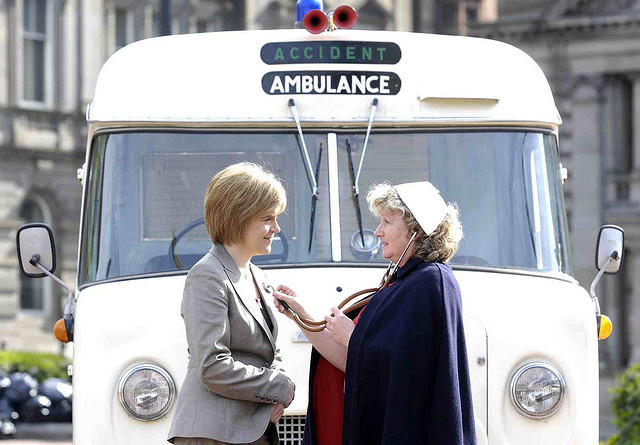The possibility of the SNP joining a Westminster coalition offers several intriguing possibilities
Following the last General Election, Labour were encouraged to pursue a ‘Rainbow Coalition’ of different nominally progressive parties, including the Scottish National Party. With the next election far from certain in terms of outcome, it is possible that such a scenario could present itself again. Here, Murray Leith assesses what would happen were such an event come to pass, and concludes that it would represent a bold step into the political and constitutionally unknown.

The UK’s next Deputy Prime Minister? (Credit: the Scottish Government, CC BY 2.0)
After the 2010 UK election, some individuals urged Labour to try to form a rainbow-style coalition with the smaller parties in the House of Commons. According to the maths, several potential groupings were possible. Apart from the Liberal Democrats, Labour’s partners could have included the SNP (six MPs), Welsh nationalist party Plaid Cymru (three), and even Caroline Lucas, the sole Green MP, and Naomi Long, the Alliance member from Northern Ireland.
Such a group could have formed a working majority within the House of Commons. The presence of the Speaker and the absence of elected Sinn Fein members brought down the number required for a majority to about 322. As Labour had 258 MPs and the Lib Dems 57, only an additional seven members would have been required to form a majority. But any such plan failed when the Conservatives negotiated their coalition with the Lib Dems.
And if you thought that was interesting…
But in 2015 such a prospect may again be plausible, if not actually a requirement for either of the two major parties to establish a working government. After all, the UK in 2015 will be a very different place in electoral terms than in 2010.
After the Scottish referendum vote, we have witnessed a surge in SNP membership and potential electoral support, leading some to predict it could win upwards of 20 MPs, displacing Labour in many of its traditional seats. Meanwhile in the south we have witnessed the defections of two sitting Conservative MPs to UKIP. They will both now seek to defend their old seats in by-elections – with strong-to-excellent chances that both will be successful. A good handful of UKIP MPs is now considered a possibility by some.
A UK government with Scottish Nats?
Admittedly there are many factors that could alter the mathematics quite easily. Will UKIP split the right-wing vote in the south of England and keep some Lib Dems alive in the south-east and south-west? Will people turn out in Scotland in 2015 as they did in 2014. And if not, who will turn out? Remember that the SNP do less well in the general election than in the Holyrood elections, where fewer people turn out to vote.
But if the SNP does triumph in May, are there any circumstances in which it could actually join a government? It is possible, but I would say it is very doubtful. The rhetoric that the SNP has employed in the last few years seems to have left it with little room to manoeuvre. It has gained significant support in the past two years by being seen as the “anti-Westminster”, “anti-business-as-usual”, “for the people” and “NOT Labour” party.
The phenomenal rise in party membership is predicated on such a style. For the SNP to become part of that London-based establishment would perhaps be beyond what many of these new members would find acceptable – perhaps even many of their longstanding members too.
Somewhere, over a rainbow
The backlash might be reminiscent of what the Lib Dems have suffered (especially in Scotland). And as a nationalist party, the SNP remains a broad coalition, subject to occasional fracture. While UKIP has been recruiting erstwhile Conservative representatives, for instance, one SNP MSP has left the party due to its changed stance on NATO. Joining a Conservative-led group is particularly unthinkable, especially as further austerity and public spending cuts would be core issues post-election.
Becoming the junior partner in a Labour-led government is not much more credible. The SNP might be able to work with Labour in other circumstances, however. Certainly they have a lot in common, especially in Scotland, where the two parties’ manifestos are not too far apart on many central policies. As tribal as Scottish politics always is, this is one of the reasons the SNP and Labour have fought so bitterly over the years. The activists and politicians have long known that at the end of the day, they are fighting over many of the same voters.
If Labour were leading a rainbow coalition including the likes of the Welsh nationalists, rather than a two-party coalition, it might remove any sense that the SNP was joining a London establishment. Another route to the same outcome might be stay out of government but form some sort of agreement or pact, supporting on some issues only to enable a minority government – again probably only Labour – to hold the balance of power.
In either case, the SNP would surely insist on the highest possible price short of independence: a fully federal UK. The question of whether it would renege on its own policy of abstaining on England-only matters would be among the most fascinating.
If the Scottish independence referendum was indeed the turning of a new page in the country’s politics, all bets would be off – new SNP leader Nicola Sturgeon (assuming it is she) may well be faced with this kind of scenario. But if September 2014 turns out just to have been a moment in time, the system will slip back into regular gear as people return to their lives. Many in Scotland took time off from careers, studies and families to campaign for a Yes vote. They might not be able to keep that up.
Until we know either way, there is no telling what could happen after the next election. The future, as the old cliché goes, is uncertain at best, but it will surely be very interesting.
—
This article was originally published on The Conversation, and the original article can be found here. ![]() It represents the views of the author and not those of Democratic Audit or the LSE. Please read our comments policy before posting.
It represents the views of the author and not those of Democratic Audit or the LSE. Please read our comments policy before posting.
—
 Murray Leith is Senior Lecturer in Politics at University of the West of Scotland
Murray Leith is Senior Lecturer in Politics at University of the West of Scotland





 Democratic Audit's core funding is provided by the Joseph Rowntree Charitable Trust. Additional funding is provided by the London School of Economics.
Democratic Audit's core funding is provided by the Joseph Rowntree Charitable Trust. Additional funding is provided by the London School of Economics.
Yes voters being called ‘nazis’ by Labour no campaign during referendum should ensure there is no collaboration with fascist Labour party.
They are finished in Scotland.
The possibility of the SNP joining a rainbow coalition at Westminster offers several intriguing possibilities https://t.co/hr4UbzeyDS
Could @theSNP join a Westminster coalition? https://t.co/xar1qBdHti
“@democraticaudit: Could @theSNP join a Westminster coalition? https://t.co/8d2AHsJ865” Didn’t Scotland vote to remain part of the UK 🙂
The possibility of the SNP joining a Westminster coalition offers several intriguing possibilities https://t.co/63hhjOw23S
Possibility of #SNP joining a Westminster coalition offers several intriguing possibilities https://t.co/UpfOh7VjVx https://t.co/AI9jfCKGQS
The possibility of the SNP joining a Westminster coalition offers several intriguing possibilities https://t.co/ayP8fFcPsj